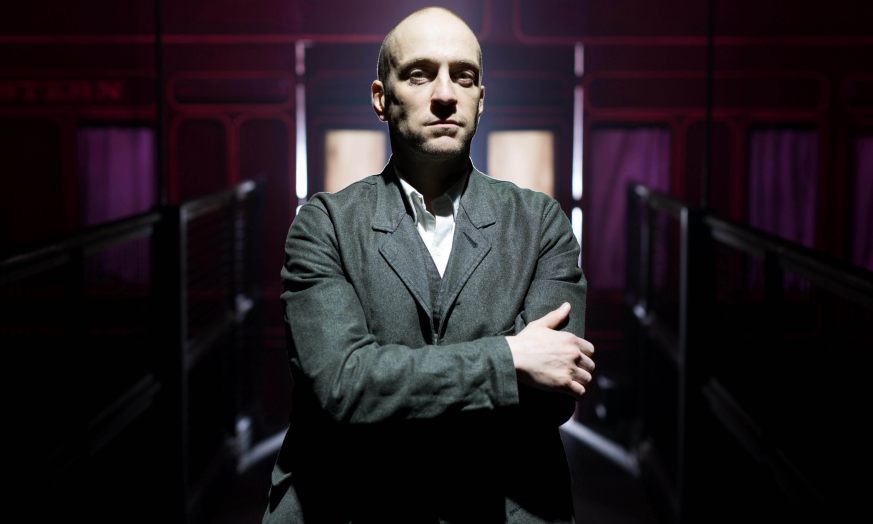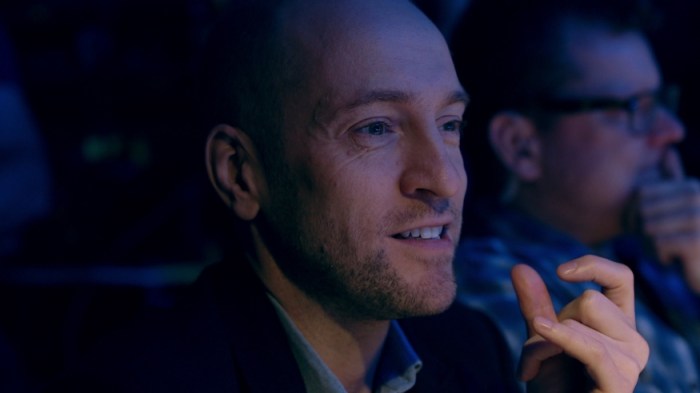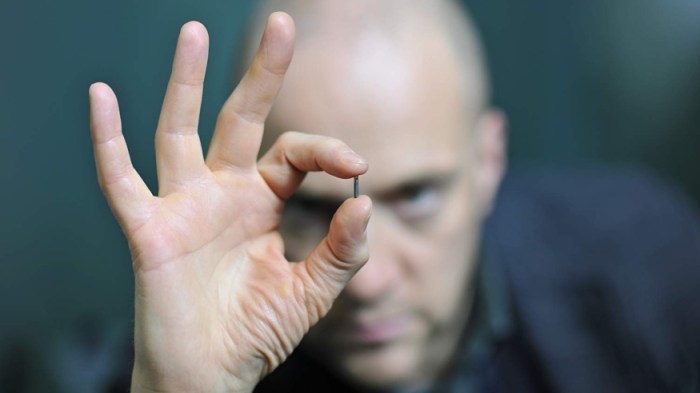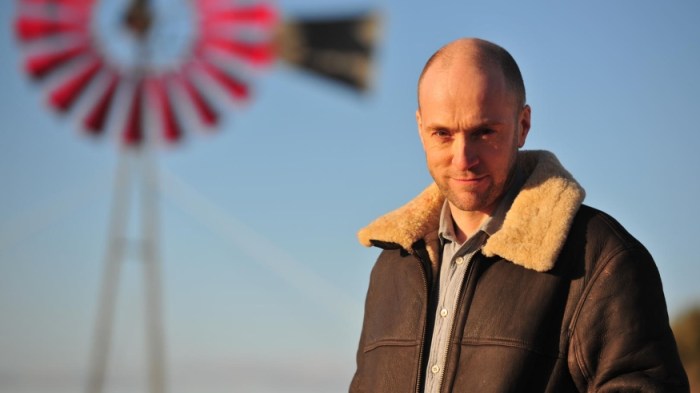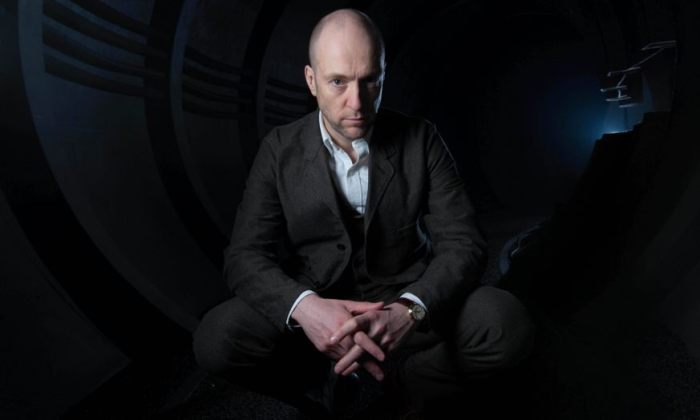For over the last decade Derren Brown has astonished and wowed British audiences with his unique blend of illusion, mind-trickery and good old fashioned magic.
Last year, Brown even brought his show over to New York, where he mystified and bamboozled audiences with his efforts. That was more than enough to convince Netflix to invest in Brown, and “Miracle” marks his second special, after “The Push” was released in February.
“Miracle” sees Brown exploring and exposing the phenomenon of faith healers, as he cures the sick, removes crippling pains, and even restores eyesight. But Brown recently admitted to me that while he was meant to parody faith-healers, he’s not actually sure if he just became one instead.
Check out my full interview with Brown, which explores his beginnings, “Miracle,” and his ventures to the US, below.
How do you label yourself now?
I don’t really. For years I had to give it some label. So I said psychological illusionist. But that doesn’t really mean anything. That just begs further questions. I started off as a hypnotist. And then a magician. But then grew out of that. As my career took off I tried to take more grown-up roots to take those, because magic is quite a childish urge. And it has taken me in all sorts of directions. And it is quite difficult to define it. But that kind of works for me, too. I like that.
How did you get started?
When I first started, I saw a hypnotist while studying law and German at Bristol University at the end of my first year. It ticked a lot of boxes, I decided that night it was what I was going to do, ticked boxes of control and being insecure, hypnosis gave me this interesting thing and role, extroverted people responded to it, who intimidated him before, at the time I just wanted to perform, then later on I realized what those stirrings were.
What’s been the biggest change to your performances over the years?
I think the big change that happens, and is helpful for anyone in that world, is that it is less about me. When you start off as a magician you are basically saying, ‘Look at me, aren’t I clever.’ Which is probably fine for a short while. The trouble is it is not a dramatically sound premise. It is not that interesting and doesn’t lend itself to much longevity. Now I try to make the shows about other people and I am kind of behind the scenes. Then when you are watching real people go through some real-life things or an experience that is dramatic then I think that is a much more interesting premise. When I do the stage shows it is a little different. It is hard not make the stage show more focused on you. Then I try to make the experience about the audience.
Talk about “Miracle,” what did you want to explore with it?
I had done a show called ‘Miracles For Sale.’ A TV show, where we took a scuba instructor out to Dallas and try to pass him off as a Faith Healer. Someone without any divine inspiration, see if he could do the same thing. So I trained him up in what I understood to be the same techniques. And as we were doing that I was thinking, ‘God, this would be amazing to do myself.’ Not as in to pretend to do it, but to explore this naturally. It feels fascinating. We did that show, and it always stuck in the back of my mind. For someone like me, who is skeptical and a sort of magician, and to perform for an audience that is mostly sharing my views, to get them to be part of doing some faith healing, because when you see that stuff being done “for real” they’re there expecting it and wanting it and most of the psychological work is done. This was the opposite of that. This was an entirely skeptical audience, completely wrongly placed, and I am asking them to suspend their disbelief. And all of those things that I thought wouldn’t really make it work but would hopefully make it work well enough that I could massage it into a show. It was fascinating how little it took, it took me just saying, ‘Go along with this.’ And reframing it, I had to reframe it in a way that was not adversely religious, but like I was able to take something from that world and had found something useful. And if you do this, and go along with it, you’ll find it useful. It doesn’t take much to reframe something. And then I was just treading a fine line between a parody of that world and actually doing it. With a lot of stuff I do there’s not really a clear template. I just kind of have to find my way through it. And trust the theatricality of it is clear and the subtext is there. Plus, with this one, I could finish it and then explain it. Not explain it explain it, but say, ‘This is what you have seen and this is what I would like you to take away from it.’ Which meant I didn’t spoilt it before I started it.
Was there anything you wanted to expose?
Well “Miracle” was my 7th stage show that I have done in the UK. Not quite my current one, but was the previous one. There are some things in the world of magic and suggestion and persuasion and mind reading, the same skills get used by charlatans in various forms. They get used in different ways, and have different appearances. It is often interesting to me to make it about something more interesting than just tricks and trying to look clever. Over the years I have exposed how psychics work and so on and so forth. But then again that becomes less interesting to me. But what becomes more interesting is how we become to believe in those things. Why we want to. And what gap it is in our culture and the stories we tell in our culture that make these people flourish. So Miracle, a large part of it is faith-healing. Recreating the Evangelical faith healing, and debunking it. I am doing it ironically. But doing it none the less. On the one hand it is a debunking and a recreation of that, but at an other level the show is really about the stories that we tell ourselves and live by. These are things that I return to quite a lot. What was amazing doing the show every night was seeing how the stories that we live out affect us in terms of these sort of conditions and illnesses that we live with and what a difference it makes when these stories are interrupted and made to change to them. Which is why these performers create the sort of effects that they do. Sometimes it is obviously just trickery, and it is transparent, but sometimes it is extraordinary experiences. And it was amazing to see that from night to night.
What’s the most striking difference in US and British audiences?
Audiences are interesting because how people react and what they respond and laugh at is different, it is totally different to what you would laugh at personally. There’s another strange thing in the air that just dictates that. Audiences are a strange meter of what is acceptable in the air. It is a very gradual process to figure that out. When you go out to do a show in New York you have got a room of very distinct individuals, as in the city, everyone has got their distinct personalities turned up to 11, and it is part and parcel of being American, and the American tradition, and the American psychological position, all of those things are about individuality. Whereas in England you get much more of a group response and a very much crowd response. Whereas in New York it was individuals narrating their own experience throughout, shouting out, ‘Oh God! No! F***!’ Which would never happen in England.
“Miracle” is now available on Netflix.

